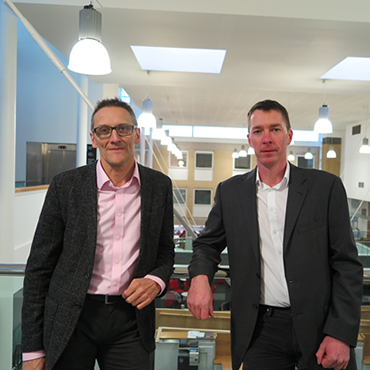LUMS to help deliver £3m Government-commissioned research to help law and accountancy firms adopt new technologies

Lancaster University Management School will help deliver a major new research project to help mid-sized law and accountancy firms adopt artificial intelligence and machine learning technologies to improve productivity and develop new business models.
Commissioned by Business Secretary Greg Clark, the Innovating Next Generation Services through Collaborative Design project will help professional service businesses to adopt the new technologies, focusing on firms that are cautious or uncertain over how to implement technological change.
The project, led by Professor Tim Vorley from the University of Sheffield’s Management School, will involve a collaborative team of researchers and forms one of three successful bids to the Industrial Strategy Challenge Fund (ISCF) Next Generation Services call.
Professors Martin Spring and James Faulconbridge will lead the Lancaster University arm of the research. They will join forces with colleagues from the University of Sheffield; Manchester Business School; The University of the Arts, London; as well as non-academic collaborators the Managing Partners’ Forum and Normann Partners.
Rather than focusing solely on the new technologies as such, the research will involve exploratory prototyping of technology-based business solutions designed in collaboration with firms to enable a rapid generation and assessment of potential future applications of artificial intelligence across businesses. This is critical if adoption within sector firms is to broaden.
The services sector accounts for almost 80 per cent of the UK economy, with professional services the largest sub-sector representing 11 per cent of GDP.
Professor Spring said "This project presents a tremendous opportunity to make a real impact on a vital and potentially world-leading sector of the UK economy. It will also show how the deeply engaged, multi-disciplinary ethos of our Centre for Productivity & Efficiency and Centre for Technological Futures can be harnessed to tackle society’s grand challenges, based on excellent scholarship and research.”
Professor Faulconbridge said: “In the twenty years that I have been studying professional service firms there hasn’t been anything as significant as recent developments in artificial intelligence for the way accounting and law firms are organised and work is completed. This project will allow us to understand the transformations that artificial intelligence might bring in the near future and what this means for firms and the professionals working for the firms”.
Richard Chaplin, a co-investigator from the Managing Partners’ Forum, said: “The potential of AI remains hypothetical unless and until the leadership team at a firm has the authority, confidence and knowledge to persuade frontline advisers to embrace new ways of working. ‘Command & control’ is seldom a viable route to bring about change at a professional firm.”
Business Secretary, the Rt Hon Greg Clark MP, said: “The UK is the home of AI - from Alan Turing’s pioneering work to today’s growing use of AI throughout the economy. Artificial Intelligence is changing how we work, live and play.
“Through our modern Industrial Strategy, we want to build on our history of innovation to develop and deploy AI to create new opportunities and improve services across the whole economy.”


